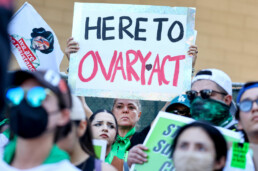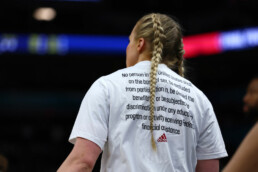Drag is good for kids, actually
|
Salutations Meteor readers, I’ve been listening to a lot of soundtracks recently. You know that song “Everything is Awesome” from The Lego Movie? It’s an absolute banger. But lately, I can’t help but replace “awesome” with “awful” in my head. Everything just feels like it’s bad. There’s no solution—other than replaying “We’re All in This Together” from High School Musical. It’s an antidote to despair. Give it a try. Speaking of tweens and music, we've got a delightful newsletter for you today. Writer Ellie Rudy spoke with three “drag babies” about why they love dressing up and slaying on the dance floor. What’s a drag baby, you ask? You’ll have to read to find out. But before that, a quick ask. We recently joined TikTok and we’d LOVE for you to meet us there. (If we hit 20K followers, Samhita and I will do the High School Musical dance for you. Just don’t tell her I signed her up for that.)
Okay, now we can get to the news. Tiking and toking, Shannon Melero  WHAT'S GOING ONHighland Park: As you may have heard, a gunman in Highland Park, Illinois, opened fire Monday, killing seven people. The suspect, who has been charged with seven counts of first-degree murder so far, carried out the attack using a legally purchased rifle that was “similar to an AR-15”, despite having two previous encounters with police and sharing violent imagery online which should have disqualified him from purchasing one let alone five firearms. Nancy Rotering, Highland Park’s mayor, said of the tragedy, “I think at some point, this nation needs to have a conversation about these weekly events involving the murder of dozens of people with legally obtained guns.” That conversation has been going on far too long already. 139 days: That’s how long WNBA star Brittney Griner has been wrongfully detained in Russia. On Monday, Griner sent a letter to President Biden asking, “please don’t forget about me and the other American detainees,” and adding that she feared she might be stuck in Russia forever. Despite a whole lot of lip service, Griner’s wife charges that the Biden administration has not done enough to secure Griner’s release; as Griner's coach pointed out, “If it was Lebron, he’d be home, right?” Which is quite the double-edged sword because LeBron would in fact be home—not just because of his status, but because, unlike WNBA players, NBA players aren’t dependent on traveling overseas during the off-season to make ends meet to begin with. To raise your voice in support of bringing Brittney Griner home, consider signing this petition. AND:
 KIDS AT WERKThese “Drag Babies” Will Not Be StoppedThey may not be old enough to order mimosas at drag brunch, but these teens are already performance pros. BY ELLIE RUDY  TWEEN DRAG PHENOM THE KING OF QUEENS AT THIS YEAR'S DRAG CON (PHOTO COURTESY OF THE KING OF QUEENS) When I was nine years old, I went to South Beach, Florida, with my mom and godmother for spring break. One night, they took me out to a drag show and I was instantly enamored. These untouchable, confident goddesses amazed me. They were like every Disney princess mixed with every Marvel superhero all in one, and they didn’t care what anybody thought. I had never seen a more admirable example of how expansive gender expression can be. Drag culture made me the person I am today—not just loud, covered in sequins, and saying “YAAS QUEEN” way too often, but also creative. Drag represents our freedom to express ourselves, and that rubbed off on me. But conservative lawmakers in Texas, Arizona, and Florida want to bar children from attending drag performances and are even proposing banning “family-friendly” drag events altogether. In a press conference, earlier this month, Florida Governor Ron DeSantis described a Dallas drag show for kids as “really, really disturbing.” He told the crowd, “That is not something that children should be exposed to.” Right-wing protestors have also disrupted performances, standing outside one family-friendly drag event in Dallas last month to demand it keep children out. But despite this pressure, some kids are doing more than just watching drag—they’re performing it themselves, taking to social media to compete in online drag competitions, and putting in the werk. I spoke to three of these young queens. They told me that the right-wing attacks are taking their toll. But they also said that drag was an integral part of their identity—and a place to express themselves in a world full of trauma. (I’m referring to the children by their drag names, and using she/her pronouns.)  TWO YOUNGSTERS COMPETING IN A DANCE-OFF AT DRAG CON 2022. THIS IS WHAT JOY LOOKS LIKE. (PHOTO BY SANTIAGO PHELIPE VIA GETTY IMAGES) Vee Miyake Versace has been doing drag for two years since she was 15. Now, at 17, her drag persona is very much intertwined with her identity as a trans woman. She competes in Instagram drag competitions called fashion races, which replicate challenges on RuPaul’s Drag Race and in which contestants design and create their own garments, dance, sing rap, and even do standup comedy. She loves connecting with other “drag babies” (the term used in the drag community for non-adult queens) around the country and loves exploring her artistic side. “Drag to me, it’s all about the creativity,” she says. “It doesn’t matter what you do, how you do it, it’s just about the creativity behind it and the effort you put into it.”  THAT LASH WORK? HIGH ART! (PHOTO COURTESY OF VEE MIKAYE VERSACE) She’s incredibly frustrated with the conversation around kids and drag. “I just think it’s all so stupid at this point because there are also things like what happened [in Uvalde], but [lawmakers] are more worried about people just dressing up doing drag than actually protecting people.” Stella Virgin, a 14-year-old Ohio-based queen, describes herself as a “glamour girl” and prides herself on her makeup skills. “I give face and mug,” she says. “I am the mug queen…someone you can meet at a party who you can trust but you know you’ll also have a good time with.” She got into the drag scene when she was 12, and has excelled in the world of Instagram drag, winning two competitions. Her mother Pam beams when discussing Stella’s passion for drag, “She doesn’t need reassurance from people she doesn’t even know, just as long as she knows her family loves her and we support her,” she said. “We’re just so proud of her and we just can't say enough about her. She’s the most loving, extraordinary child.” Stella is upbeat—throughout our Zoom call, she can’t stop smiling and practically glows whenever her mom chimes in. She says the current attacks on drag concern her: “It feels like I can’t express myself how I want to, like the way I see myself.” But she manages to keep her head up by continuing to pursue her makeup and dance skills.  STELLA VIRGIN GIVING US PRINCESS PEACH, CANDY LAND EMPRESS REALNESS (PHOTOS COURTESY OF STELLA VIRGIN) “I want to do more than just online competitions,” she says. “I want to get out in the real world and showcase my talents.” One of Stella’s best friends is a 12-year-old California queen named The King of Queens. The two met through Instagram when The King reached out to Stella after admiring her online drag performances; the two eventually met in person when The King flew down to Ohio for the weekend, and have been online best friends since. I had the pleasure of meeting The King of Queens at RuPaul’s DragCon 2022 in Los Angeles. She told me she started drag when she was just eight years old after her older sister showed her RuPaul’s Drag Race. Her mom, Amy, wasn’t surprised: “Since she came out of the womb, she’s been one of those kids that just naturally performs…She’d see a group of people and just start dancing in the middle,” Amy says. When I ask The King what kind of girl her drag persona is, she replies without skipping a beat: “The King of Queens is dancing. She’s serving face,” she says. “She’s very feminine but at the same time weird.” King’s popularity has made her a target: Last month, an alt-right Twitter account called Libs of Tiktok got hold of a recording of The King of Queens performing at her local Hamburger Mary’s, a drag-themed diner chain, and posted it. Commenters harassed King and posted hurtful comments about her, says Amy. And Tiktok even took King’s account down after it was reported for “child safety.” They got it back “after several appeals,” says Amy, but “we’ve had to lay low because of that.”  ONLY THREE WORDS CAN EXPLAIN THIS: FAB. U. LOUS. AND MOM LOOKS GREAT TOO! (PHOTO COURTESY OF THE KING OF QUEENS) But even after having adults bully her on Twitter, The King of Queens is still incredibly grateful to have drag in her life—and says she uses it to soothe herself. “Drag is a way to express who I am and when I’m going through something emotionally, I will get in drag or do a weird look or something like that and it will kind of like calm me down and just put me in a place that is less aggressive.” To her—and to me—drag is a comforting, supportive space. “The community is great, amazing, loving,” she says. “I mean, everything about it is what a child like me should grow up in.”  Ellie Rudy was born and raised in Austin, Texas, and is the mother of a geriatric Chiweenie named Molly. She has written for LA Magazine, Teen Vogue, and more.  Before you sashay away, please consider forwarding this newsletter to a few friends. (Do it for the kids!) FOLLOW THE METEOR Thank you for reading The Meteor! Got this from a friend? Sign up for your own copy, sent Wednesdays and Saturdays.
|
![]()
THE FIRST WEEK WITHOUT ROE V. WADE
BY CINDI LEIVE
A lot of people were shocked by the Supreme Court’s decision to overturn Roe v. Wade last week. You saw it everywhere: OhmyGodhowcanthisbehappening?? And it was understandable: Even though Roe had been eroded mercilessly for years, dying gradually before it died suddenly, that sudden death was still startling.
But not for many organizers and legal scholars, and not for Dahlia Lithwick. Three years ago, she broke down for me over breakfast exactly what was coming for Roe (most terrifying scrambled egg meal ever). And she’s also been cautioning that the Court planned to do exactly this in her columns covering the law for Slate and on her podcast Amicus.
But she’s also someone who’s often made me feel hopeful—about change, and what our courts can do at their best. For this week’s newsletter, I asked her to talk to The Meteor about where we are seven days after this momentous decision, and what the road looks like from here.
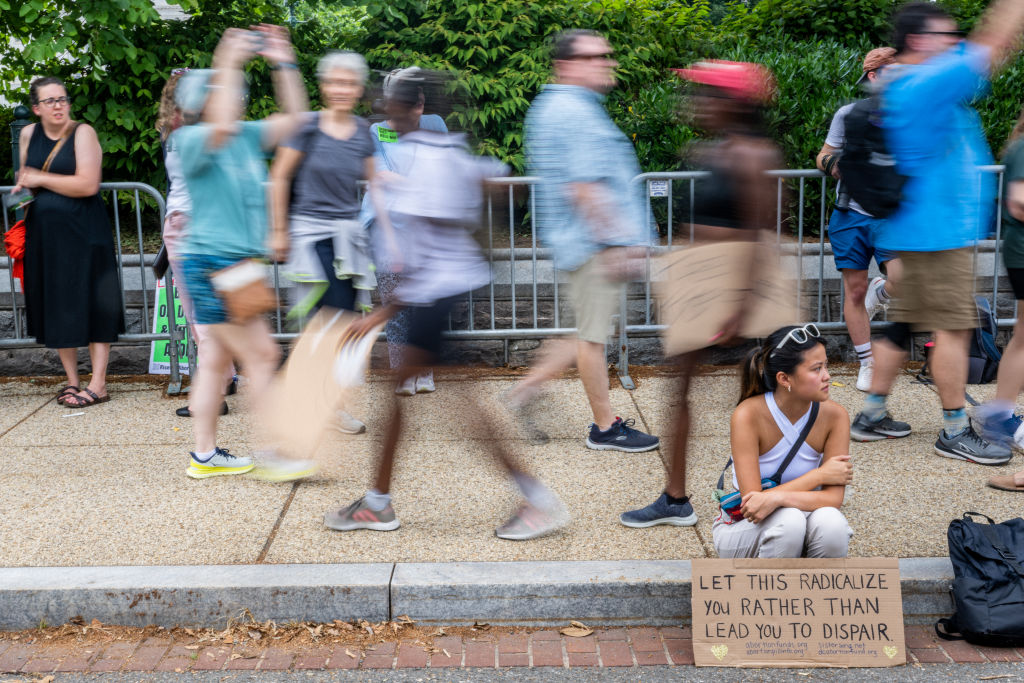
Cindi Leive: It’s been a week—which feels like a century—since the decision. What, if anything, do you feel like you’re realizing now that may not have been immediately apparent at the very beginning?
Dahlia Lithwick: What I’m realizing is the sprawling extent of the chaos. [Before the decision], we all saw those infographics—these states have trigger laws; these have preexisting zombie laws—and it looked like you’d pull a switch and that in some states, abortion would be legal, and in other states, it wouldn’t. And of course, what we’re learning is that nothing is that simple. And that in some states they are not giving plan B and in some states, they’re turning people away from the E.R. who are having routine miscarriages…There’s an infinite number of hellish possibilities in every jurisdiction. And for me, the shock is that even though I knew it would be a mishmash and a hodgepodge, [there’s] a catastrophic sprawl of uncertainty, and a chilling effect on everyone, that I just am only beginning to appreciate.
Leive: How long do you think that catastrophic sprawl of uncertainty lasts?
Lithwick: The landscape will become clearer. But I also think the lack of clarity is the point, because the point here is to have everything look like it’s on the margins, and everyone be terrified. And if you feel as though the mere act of dispensing advice is going to [get you in trouble], particularly in jurisdictions that are doing these vigilante SB8 laws that are enforced by your neighbor who’s trying to collect the bounty… the whole point is to make everybody afraid. And the more confusion and uncertainty there is, ultimately, the fewer services there are, regardless of the law in any specific place. And I think that's very much a feature, not a bug, in this incredibly sweeping, draconian way.
Leive: Before we get deeper into what’s happening right now, I want go back into how your own view of the court has changed. You wrote in 2019 that you had chosen not to go back to the Supreme Court after Brett Kavanaugh’s confirmation hearings—that those hearings [and the failure to investigate assault charges against him] were a turning point for you as a reporter. What changed then, and what’s changed from then to now?
Lithwick: I think of [2019] as, like halcyon days compared to today. [Then], I was just making a determination for myself, a moral, ethical determination that I couldn't use the imprimatur of my name and my work to legitimize a seat that I thought was obtained through lying and through a very flawed [confirmation] process. You can’t be a journalist who covers that process in all its intolerable injustice, and then just the next day be like, ‘Cool, now I’ll call him Justice Kavanaugh.’ It felt unethical to me. [Now, in 2022], it’s no longer just about the flawed process. That's certainly part of it: You know, Donald Trump massively profited from a stolen seat that was withheld from Merrick Garland, and then Mitch McConnell subverted his own rule and slammed Amy Coney Barrett onto the court while voting had already started in an election in which Trump would lose. So two of the three seats [Trump filled on the court], not including Kavanaugh, are deeply illegitimate. But this [the wave of 2022 decisions] is kind of different.
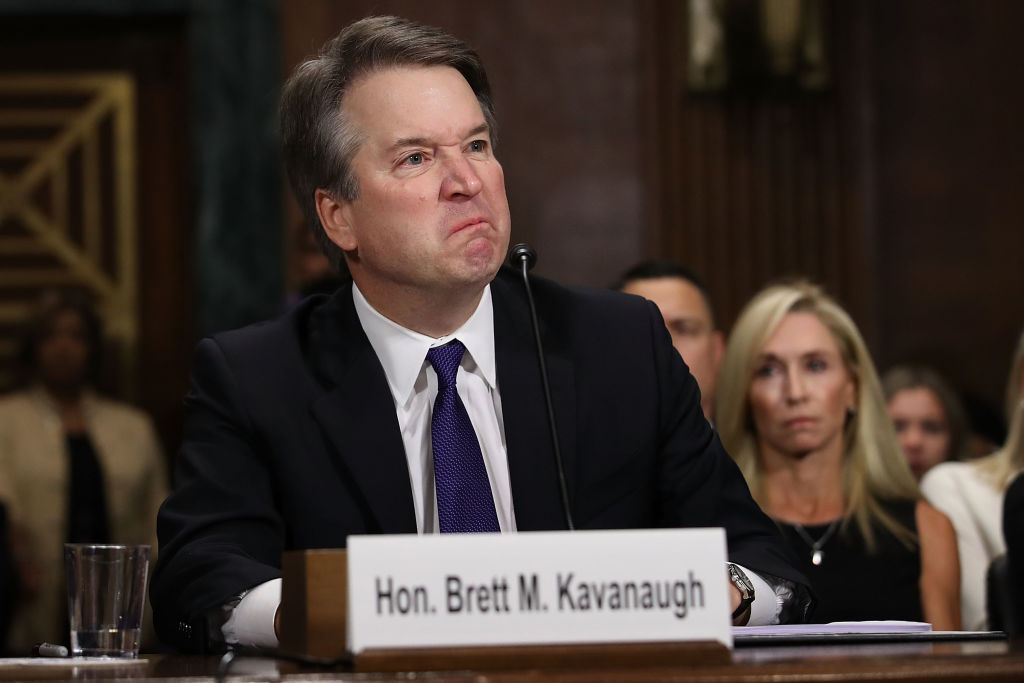
Leive: Different in what way? I know you’ve said that what was shocking to you in Dobbs was the court’s willingness to completely jettison anything that could have made them look apolitical. Why was that chilling?
Lithwick: This really started for me in the fall when SB8, Texas’s vigilante law, sneakily went into effect overnight, at midnight on the [Supreme Court’s] shadow docket, which is the emergency docket—[it felt like] something really fundamental had changed. They essentially dropped an order in the middle of the night with very, very little doctrine and couldn’t even be bothered to have the respect of hearing the analysis and writing an opinion—they just literally exercised raw power. And to see a tenth of the childbearing population in the United States suddenly told, Roe v Wade is still good law, but in Texas, you cannot avail yourself of it—I mean, it’s just nullifying your rights. Good luck. And then in the maelstrom of response to that—when the court had these historically low 36, 37% approval ratings, massive public recriminations, and anger—the justices’ response was to blame the press. They completely decimated the legitimacy of the court in the span of a year, [and] it’s our fault because we reported on it truthfully?
For me, [it’s] a double betrayal. Part of what is so frustrating is—the conservative critics are like, you just don’t like the outcomes [of the cases]. No, I don't like the outcomes! That’s part of it. But I don’t like living in a world in which the court is completely populated by partisans who don’t give a shit.
[And] I am not one of those people who says “Good, everybody should know it’s illegitimate.” I’m not in the burn-it-all-down camp. And I’m not in part because Sherrilyn Ifill, the former head of the NAACP Legal Defense Fund, reminded me that we don’t do well when there is no court at all. It never redounds to the benefit of women and people of color and minorities and immigrants. We’re the ones who get steamrolled first. And I’m sure you’ve heard me say this before, but once there’s no functioning court, plan B is the army, and it’s not good for women.
That said, this court is not legitimate. And to kind of continue with the charade that like, “Oh, it’s not that bad and maybe it will stop at Obergefell” [the Supreme Court ruling that guarantees same-sex marriage], I’m not prepared to lie to give this court cover…And so I just I’m sitting very, very uncomfortably on that boundary between needing the court to function—and certainly needing it to do so before 2024, when I think it will decide an election—and also knowing that the court as currently constituted is not legitimate, and if we don’t rail against it, it’s only going to get worse.
ARE OUR OTHER RIGHTS AT RISK?
Leive: I want to pull on a few threads there. You’re talking about people saying it will stop with Obergefell and maybe it won’t be that bad and maybe they won't really go after birth control and same-sex marriage. I’ve heard that too this week. And I guess the first question is, how serious do you think those threats are? And then do you think that people in general, and the media in particular, are taking them seriously enough?
Lithwick: Look, for years, we’ve been hearing, “Oh, Roe v. Wade is good law.” Each of the three Trump nominees told us that Roe v. Wade was precedent of the court. Every time I would write a column saying, “Oh, hell no, I’m telling you right now, this is it, it’s over, that’s five votes to reverse,” and every time we were told we were hysterical. And that’s incredibly gendered: It was always women journalists who were being gaslit and told that they were overreacting and that they were crying wolf and that they were seeing shadows and ghosts everywhere that didn't exist.
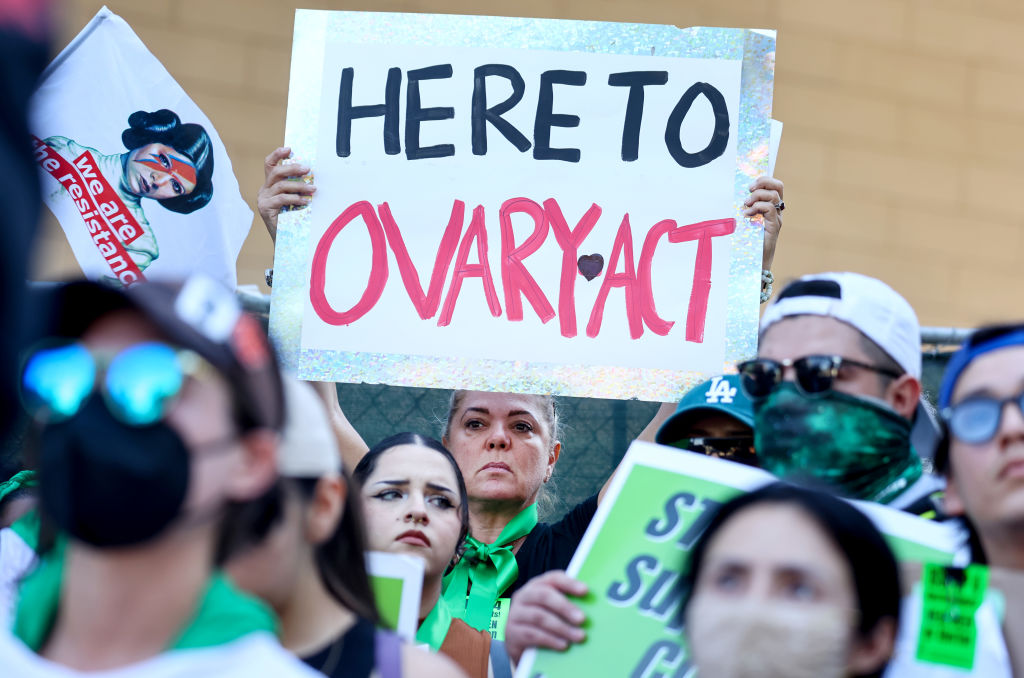
I remember the week SB8 went into law in Texas, having Michele Goodwin and Rebecca Traister on the podcast, and all three of us agreed that this meant the death knell for Roe, and having listener mail come in like, “Oh, like I need to listen to three hysterical women shrilly warning about a thing that's never going to happen?” And I did an Intelligence Squared debate with Akhil Amar, one of the most legendary legal thinkers in the country, who insisted that none of the things that came about this term were going to come about. So—it's fine, I have gotten accustomed to it, but I think that it's phenomenally weird to be told that the thing is not going to happen, and then in the wake of it actually happening last week, to be told, “OK, but the next thing isn't going to happen.” I joked to a friend of mine that this must be what Jeremiah and Isaiah felt like, where they're like “Dude, it's really, really, really bad,” and everyone's like, “But not this time!” as the locusts are swarming. I'm not comparing myself and Rebecca Traister and Michele Goodwin to Jeremiah, but—
Leive: I mean, you know, in my Bible...
Lithwick: [Laughs] I’m not saying it's biblical. I'm saying it's science and fact and reason. And so I think when I read those key paragraphs in Dobbs, where Justice Alito is trying to say “It stops here, it doesn't go any further,” I think his reasoning is laughable. When the same court that just told you they don't actually have to have a principled reason for doing something, they just need six votes, when they say “We're not going to do the next thing, trust us,” my own kind of Jeremiah-ish worldview is like, Mmm, not so much going to trust you this time.
You’d have to be catastrophically stupid to trust him after what we’ve seen this term, where gun rights, reproductive rights, religious liberty rights and the existence of the administrative state [in the EPA decision] have all been usurped in the matter of a sweep of the pen.
THE VOTER SUPPRESSION LINK
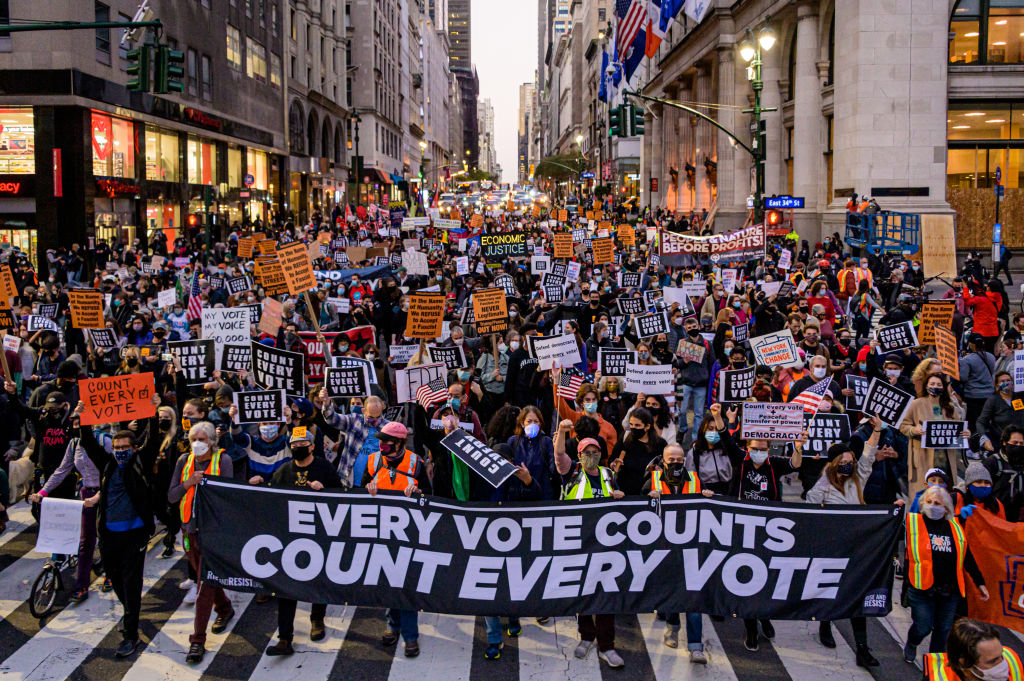
Leive: You said a few minutes ago that the Supreme Court will decide an election in 2024. Briefly explain to readers why that is.
Lithwick: So my obsession this year is trying to connect abortion rights to voting rights. And I think the best way I can say it is that if you take Justice Alito at his word when he writes in his majority opinion in Dobbs not to worry because this decision “allows women on both sides of the issue to seek to affect the legislative process,” when he very smugly says, you know, if you don’t like it, vote—to me, that's kind of hilarious coming from one of the perpetrators of the most systematic encroachment on the right to vote that we’ve ever seen, certainly since the civil rights era. If you just look at the sort of rap sheet that Justice Alito himself carries with him—whether it’s voting in Shelby County to eviscerate part of the Voting Rights Act, whether it’s being with the conservative majority in persistently upholding partisan gerrymanders, whether it’s authoring another case that rendered almost inoperable another section of the Voting Rights Act—it’s a crackup for him to say “Vote!”
The same six people who are taking away the right to choose are engaged in a years-long project to take away the right to vote. [Especially] if you are Black, if you are a student, if you are disabled.
Leive: So they say “we're just returning it to the states.” But they’re returning it to an essentially nondemocratic process in those states at this point.
Lithwick: Yeah. I would say the number one question I’ve had this year from reproductive rights folks and gun folks is: how is this happening? You have 75-80% of Americans who didn’t want Roe to come down, 80% of Americans who want certain kinds of gun reforms, 80% of Americans who did not want concealed carry laws to be gutted in seven of the most populous states in the country. So they ask: How does it happen? This is not what I voted for!
And the answer is both what we just said, which is that partisan gerrymanders make it absolutely certain that races are uncompetitive, that elected officials are choosing their voters rather than voters choosing their elected officials. But also, and I think this is when people’s eyes glaze over…but it’s just simply the case that five of the six conservative justices on the Supreme Court were seated by presidents who lost the popular vote [George W. Bush and Donald Trump], and ratified by a Senate that collectively represented vastly fewer [people] than the half of the Senate that voted against them. And you know, all of this was kind of blessed by a completely ridiculous Electoral College system that ensures that minority rule will persist forever into the future. And so the system is working exactly as it was designed to work at the foundation: to suppress those massive, massive majorities in order to throw power to rural agrarian states and to take power away from urban, multiracial cities. And so what we are seeing as a systems failure is a systems feature. This is what this kind of malapportioned Senate and the Electoral College and the filibuster were built to do.
Leive: I think about this all the time because I look back at my time at Glamour [where Leive served as editor-in-chief], and I published a lot of stories about abortion and was proud of that. But, you know, we didn’t cover the gerrymandering that was starting to happen in 2010, or the Shelby County Supreme Court decision in 2013, and that’s on me. And as we know, voter suppression and gerrymandering are huge parts of the reason that we're here, [since they allow state legislatures to overrule the majority]. And so part of what I think about is—how do we channel that same determined energy that people are feeling right now about reproductive freedom around things like the Electoral College and gerrymandering and voter suppression?
Lithwick: Look, I was on the same track as you. And I thought, if we just get women to think about this sort of parochial question of, like, “my body, my choice,” it will be enough. But when I was working on [my new] book, I realized that if you care about…reproductive freedom and civil rights and all the other ways that women were assaulted in the Trump era, the only way to pick your way out is these big structural reform issues.
I was on a briefing a few weeks ago after Dobbs came down. And I had a pollster say to me, “Dahlia, women just don’t care about structural democracy reform.” And my answer was kind of like, well, then prepare to keep losing, because you can’t fix this with buying tote bags and marching. And it’s not as though there aren’t state compacts to do away with the Electoral College….It isn’t as though there aren’t efforts to [counter] gerrymandering. We don’t have to invent it! It’s all being worked on, and by amazing people, including Stacey Abrams. But that has to become absolutely the locus of organizing. And we have to learn from Black women who’ve been telling us this is how they’ve been organizing forever.
Leive: Yeah, and going back to the person who told you that women just don’t care about democracy, I mean, that’s specifically white women, right?
Lithwick: Both Professor Carol Anderson and Sherrilyn Ifill have told me this year on the podcast [that] if you thought that Roe v Wade was the law, you never lived in Mississippi. If you thought one person, one vote was the law, you never lived in Georgia. And if you lived in Alabama and wanted to get an abortion after Hyde [the provision which bars the use of federal funds for most abortions], it was almost as unreachable to you then as it is now. And so many of these things that we think are these immutable rights are not—they’re paper rights. And white people benefited from them and white women definitely benefited from them.
But just because you benefited from the system doesn't mean the system worked. And Carol Anderson always reminds me—she’s like, strap on your fanny pack, bring your battery charger, bring some water and be prepared to stand in line for 6 hours. Because that’s how Black people voted in Georgia in my whole life.
WHAT WE DO NOW
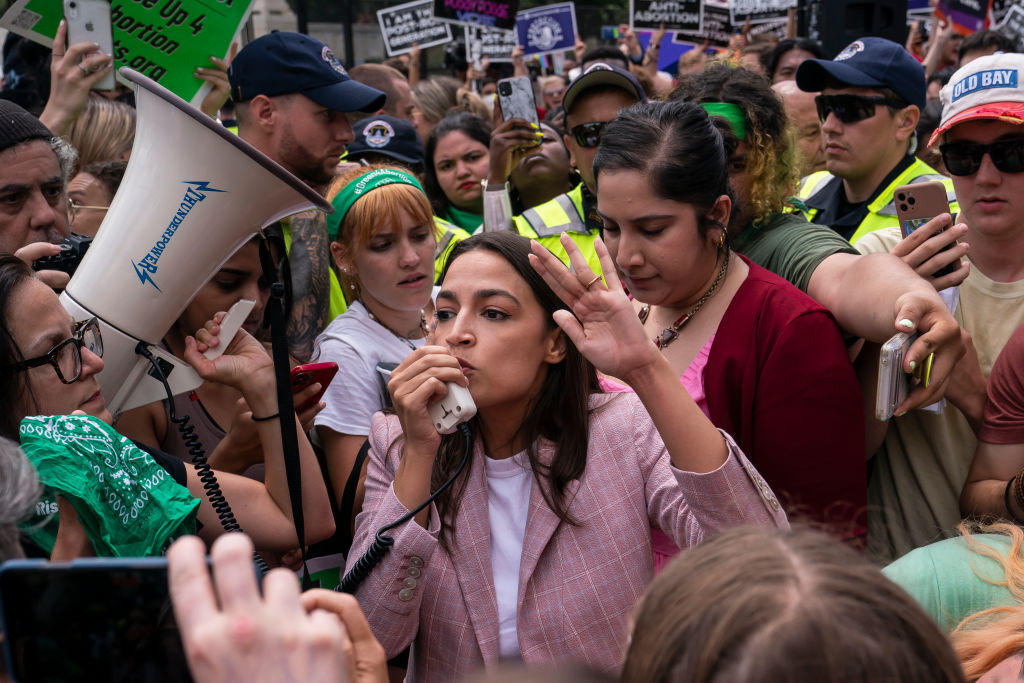
Leive: You know, you used to use this analogy that I loved, about the Yellowstone Park rule. Someone asked you if it was worthwhile to protest about an issue the Supreme Court was going to rule on and you said hell yeah. You said that it was like if you see a bear in the forest, you’re supposed to draw yourself up to your full height and try to look bigger than the bear; people should be going out to protest and be visible, ’cause the Supreme Court does actually care what people think, and we’ve got to be bigger than the bear. And now, I mean, here we are. And it feels like the bear just ate us.
Lithwick: And also didn’t care what we thought. (I really believed that they would—that, you know, 25% popularity would be salient to them. And I'm scared because the fact that it's not salient to them tells me that they're bigger nihilists— they just don't care if it burns down.)
Leive: So where are you drawing your sense of hope now? What is the 2022 equivalent of being bigger than the bear?
Lithwick: Well, two things. One is understanding what that basket of protections in the 14th Amendment [which guarantees “unenumerated” rights that have been interpreted to include bodily autonomy, privacy and more] were meant to be. They were deliberately intended to be the kinds of freedoms that were conferred upon enslaved people who were freed and who had been denied those rights. It does you no good if you are an emancipated [former] enslaved person to have the Bill of Rights—your body could still be given to somebody, you could be separated from your spouse, your children could be taken away from you. None of that is protected in the Bill of Rights and all of those rights [were] the animating idea for so many of the drafters of the 13th and 14th Amendments.
And I think we’ve let that history slide…and when I heard Ketanji Brown Jackson's confirmation hearings and I heard senators just like laughing about these rights and making it sound as though it’s just kind of constitutional ephemera and that it’s meaningless and that it’s just like toilet paper on the bottom of their shoe, I thought about what that story means, particularly to Black women. They were being given the right that they had never had to determine who their family was and that nobody could take that away. That’s not nothing. That's kind of everything. And I have been trying to come to this 21st-century crisis with the knowledge of what the Reconstruction Amendments really meant. And in Michele Goodwin's incredible expansion of that work and Dorothy Roberts’ incredible expansion of that work. And that's a really lawyerly answer. But it's also almost soulful for me.
And second, I think that we have this really hard task, which is—the July 4th weekend is upon us. And if we just absorb this [setback] and integrate it and then move on and don't turn it into the most urgent, existential fight of our lives, this is not going to end here. I think this is really one of those If not now, when? moments. We’re not going to have another chance. We have to think about turning our shock into power, and into purposive action, and not just resignation. That means connecting this to the midterms. Connecting it to voting reform. Connecting it to structural reforms of things as arcane as the Electoral Count Act. And you know, we could add four seats to the court tomorrow. It’s absolutely doable. We can’t concede fights that we haven’t fought yet.
So for now, we have to hold onto the fact that we do have the vote and we do have our voices and there's more of us than them. And as long as there's more of us than them, I deeply, deeply believe, we can be bigger than the bear.
I really believe it even now.
Could Title IX be next?
|
No images? Click here Dear Meteor readers, I am sure you are still reeling from SCOTUS’s decision last week to overturn the constitutional right to abortion. I have been reflecting on these words from an interview our editor-at-large Rebecca Carroll did with journalist Rebecca Traister: “We are living in minority rule.” We are. That has to change. And, right now, I have to believe that one day it will. Today, we wanted to take a moment to celebrate a milestone you might have missed amid last week’s chaos. My newsletter co-sherpa Shannon talks to Alexandra Brodsky about the 50th anniversary of Title IX. But, first, we try to make sense of all this news. Xo, Samhita Mukhopadhyay  WHAT'S GOING ONThe Disappointment party: Abortion advocates are increasingly frustrated with the response from Democratic leadership to the overturn of Roe v. Wade. Despite having seven weeks to plan thanks to the same leaked documents we all saw, they have largely met the moment with flaccid displeasure instead of fiery rage. The only plan leadership has presented is to vote in the upcoming midterm elections. Vote for what, my guy?? We voted the first hundred times around and y’all are not delivering! Someone, please engrave this line from Alexandria Ocasio-Cortez onto Pelosi’s desk, “We simply cannot make promises, hector people to vote, and then refuse to use our full power when they do.” So we will vote, but we’re going to complain the entire time until AOC turns 35.  Truck of horrors: On Monday, a semi-truck containing migrants attempting to cross the border—most of whom had suffocated to death—was found abandoned on the side of the road in San Antonio, Texas. According to Time, Border Patrol and the Department of Homeland Security have stopped the entry of an estimated record-breaking 200,000 migrants in May alone. Why? Trump administration policies like Migrant Protection Protocols and Title 42, which have left the border “all but closed to legal migrants and asylum seekers” are still in place. The Biden administration has barely lifted a pinky to undo these policies; in fact, it fought to keep Title 42 in place. Yet all of this didn’t stop professional clown and Texas gubernatorial candidate Greg Abbott from blaming these deaths on Joe Biden’s “deadly open border policy.” Read a fucking book, Gregory. Small wins: So-called “trigger bans” continue to go into effect after last week’s decision, but abortion providers in Texas, Utah, and Louisiana are fighting back. In Utah, doctors will temporarily be able to perform legal abortions (up to 18 weeks) after a judge granted a temporary restraining order on the enforcement of trigger laws. Similar restraining orders have been granted in Texas and Louisiana as well, although, in the case of Texas, patients can only legally have an abortion if they are within the six-week threshold. (You’ve probably heard this a million times but it is worth repeating: most pregnant people don’t even know they are pregnant until around eight or nine weeks.) Click here to find out what you can do for those seeking abortion right now. AND:
 GOLDEN ANNIVERSARYCould Title IX Go the Way of Roe?An assessment from Alexandra Brodsky, who's spent her career fighting to expand this now-50-year-old law BY SHANNON MELERO  AN NCAA BASKETBALL PLAYER SPORTING TITLE IX LANGUAGE ON HER WARM UP TEE (PHOTO BY ELSA VIA GETTY IMAGES) If you missed the 50th anniversary of Title IX on June 23—no one would blame you. The gutting of reproductive rights in America happened the very next day, robbing all of us of any sense of joy. Which is why it’s so crucial to celebrate the few victories we still have. Title IX—the 1972 law that significantly curtailed sex-based discrimination in education—carved a pathway for women and girls to compete in school athletics. This aided in the formation of professional women’s leagues and is why its birthday has been an orgy of well-produced commercials for sneakers and energy drinks. While Title IX is best known for changing the sports landscape, it’s also done a lot of other things for girls, women, and non-binary people—like limiting gender-specific dress codes, allowing women to enroll in academic institutions previously closed to them, and, importantly, compelled schools and campuses to take steps in handling sexual assault. To understand what the 50th anniversary of Title IX means—and whether it, like Roe, could be at risk—I spoke to Alexandra Brodsky, an attorney, advocate, founder of Know Your IX, and author of Sexual Justice: Supporting Victims, Ensuring Due Process, and Resisting the Conservative Backlash. Shannon Melero: So Title IX is most closely associated with protections for women in athletics, but can you get into what other protections it offers? Alexandra Brodsky: Title IX prohibits sex discrimination in schools and other educational programs that receive federal funding. That includes all public schools for every age group, and almost all private colleges and universities. Title IX requires equal access to educational programs, like STEM classes, for students of all genders. It prohibits schools from discriminating against pregnant and parenting students. It forbids anti-LGBTQ+ discrimination. It forbids sex discrimination in school discipline. As I discuss in my book, Title IX also requires schools to prevent and address sexual harassment, including sexual violence. We are now living post-Roe, a reality that felt improbable for quite some time until it just wasn’t. Are we at or near the risk of losing protections given to us under Title IX? I don’t think Title IX itself is going anywhere, but I do think we are seeing a concerted effort by anti-feminists to water it down. The Trump administration fought Title IX's protections for queer and trans students and weakened the rights of student survivors of sexual harassment—something Biden [has begun to fix]. Courts keep imposing technical obstacles to Title IX’s enforcement. Going back to 50 years ago, was there a catalyst event that led to the birth of Title IX? Title IX was passed in 1972, during a wave of federal civil rights legislation. And it was passed to address widespread, blatant discrimination in education. Women were just fed up. Back then, it was taken for granted that women and girls would have fewer athletic opportunities. They were also often excluded from traditionally “male” academic disciplines. Many colleges and universities didn’t allow women to attend at all, or set strict quotas to limit their attendance. And female teachers faced blatant sex discrimination, including lower pay.  DESPITE TITLE IX PROTECTIONS, CAMPUS SEXUAL ASSAULT IS PRESENT AS EVER (PHOTO BY CHELSEA GUGLIELMINO VIA GETTY IMAGES) Is there a specific case we can point to in Title IX’s history that functioned as a turning point—in the way that Roe was so defining for abortion rights? There's nothing quite so path-determinative as Roe, but the first Title IX case heard by the Supreme Court in 1979 was Cannon v. University of Chicago. Geraldine Cannon sued the University of Chicago’s medical school over its discriminatory admissions policy. By the time the case made its way to the Supreme Court, the question was whether private individuals like Geraldine could bring Title IX lawsuits on their own behalf, or whether they had to depend on the federal government to enforce Title IX. And the Supreme Court said, yes, Geraldine could bring her own suit. I know that probably sounds boring and technical but it’s so important. We’ve seen from the Trump administration that students can’t always depend on the federal government to care about sex discrimination in schools. Students have to be able to advocate for themselves. Another big case is Davis v. Monroe County Board of Education, and it really demonstrates the dual sides of Title IX’s history. [A parent sued the Monroe County, Georgia BOE on behalf of her daughter claiming the school did not do enough to prevent sexual harassment between students.] There, the Supreme Court said that schools had a responsibility under Title IX to address student-on-student sexual harassment. That was huge! But the Court also announced a legal standard that would require schools to address only “severe and pervasive” harassment, and said they only had to respond in a way that wasn't “clearly unreasonable.” Basically, schools could mistreat survivors so long as they didn't mistreat them really badly. So even in this moment of triumph, we saw the Court imposing real limitations on students’ rights. To your point, how have we seen Title IX develop over the last 50 years? Have protections shrunk or expanded? The answer is really both. Courts and advocates have, over the years, recognized Title IX's breadth, and seen how it can protect students who experience all these different kinds of sex discrimination. That progress is still ongoing. Just last week, a federal appeals court published a big opinion explaining that Title IX forbids discriminatory dress codes that impose different rules on boys and girls. And recently we've seen advocates successfully use Title IX to challenge transphobic school policies and state laws. So, in that way, protections have expanded. But, at the same time, courts have adopted rules and standards that make it quite difficult for students to enforce their rights. For example, the Supreme Court has established a very high bar for student survivors to hold their schools accountable in court for mishandling sexual harassment allegations. Many courts have also held that students can't sue over what we call “disparate impact” violations—basically when a school's policy isn't discriminatory on its face, but disproportionately hurts women and girls. Opinions like those have shrunk Title IX's power. How is the media doing at covering Title IX and campus or high school sexual assault? We've seen media coverage of sexual harassment in schools do a lot of good, and also do a lot of harm. In the early years of my organizing, smart reporting by journalists like Katie Baker and Tyler Kingkade did a lot to spur public attention and policy reform. And USA Today has recently been doing a lot of great investigative work into the nitty-gritty of how schools respond to sexual violence. But we've also seen media promote a narrative that support for survivors poses a direct and unjust threat to men and boys—[even] though a man is more likely to be sexually assaulted himself than to be falsely accused of doing so. And that narrative has had terrible policy consequences, ultimately leading to Trump's Title IX regulations. What can the average person do to ensure that we don’t lose the protections that we’ve gained under Title IX? National advocacy is certainly important, so it’s great if people can contribute their skills or support to organizations like Know Your IX or the place I work, Public Justice. But there’s also so much work that can be done on the local level. In recent years we’ve seen K-12 and college students organizing to push their schools to do better by sexual assault survivors. We’ve also seen really effective protests of discriminatory dress codes that have resulted in concrete policy changes. So my answer is basically: figure out what students are doing at your local high school, or at a nearby college, and follow their lead.  Shannon Melero is a Bronx-born writer on a mission to establish borough supremacy. She covers pop culture, religion, and sports as one of feminism's final frontiers.  FOLLOW THE METEOR Thank you for reading The Meteor! Got this from a friend? Sign up for your own copy, sent Wednesdays and Saturdays.
|
![]()
They've lived under abortion bans
|
No images? Click here  June 26, 2022 Dear Meteor readers, This Sunday, we have a special send for you. My friend and editor Megan Carpentier talked to reproductive rights activists and advocates from places where abortion was or is currently banned (including pre-Roe America). These women share advice with us on the long road ahead. Hope is important but elusive; these stories might provide some. With love, Samhita Mukhopadhyay  DEPT. OF HOPE“We’re Stuck for a Minute… But it’s Just for a Minute”Stories of strategy—and resilience—from people who have been where we are nowBY MEGAN CARPENTIER  A CELEBRATION OF DECRIMINALIZED ABORTIONS IN COLOMBIA, 2022 (PHOTO BY ELIZABETH PALCHUCAN VIA GETTY IMAGES) For many of us, the official news on Friday morning that the Supreme Court had overturned the landmark 1973 decision Roe v. Wade was a devastating loss. That devastation was not helped by the knowledge that Justice Clarence Thomas, who the day before had authored the decision significantly restricting the ways in which states can regulate handguns, was also suggesting that the Court should revisit its decisions to legalize birth control, to decriminalize consensual sex between same-sex adults, and to legalize same-sex marriage. All those decisions were equally reliant on the Court’s prior interpretation of the Fourteenth Amendment. But the truth is that we’ve known this decision was coming since Justice Samuel Alito’s draft opinion leaked less than eight weeks ago. Plus, the anti-abortion movement has, for decades, been working on the state level to pass laws that could either restrict access to abortion within the confines of Roe— see also: Casey v. Planned Parenthood and Gonzales v. Carhart—or present the Court with an opportunity to overturn it. And now they’ve done so. So the question for Americans who value reproductive rights is: What happens now? How do we help each other, help our friends, and, ultimately, win back our freedoms? But American women need not start from scratch on this new, old ground. Abortion restrictions exist around the world, and we asked leaders who have lived under them to share their advice and stories. “What you need to do with that sadness—that rage—is to use it as a catalyst to keep on resisting.”—Angie Contreras, spokesperson, Mujeres Vivas y Libres campaign in Mexico, where abortion was illegal until September 2021, when activists helped win a Supreme Court decision to legalize it Abortions are going to continue existing whether they are illegal or not. In Mexico abortions have always existed and, in states where they are prohibited, there are still abortions. That has been thanks to networks of women who have confided in other women, in other organizations, in allies, in collectives that are going to resist and inform them. Because the state cannot prevent us from exercising our rights over our bodies; only we can decide that. This is a reminder that women won these rights for [themselves], and we have to continue defending them because we can’t always rely on the state. We need to create networks among women to help each other to continue fighting for our rights. It’s valid to be sad [after Roe] because they’re prohibiting the exercise of a right that women had already won. But what you need to do with that sadness—that rage—is to use it as a catalyst to keep on resisting. Women have historically always needed to resist. We were sad for a while too, but then we organized, and we are going to continue to organize because the reality is that we don’t need the state to continue having abortions. Also, this is a good moment to learn about other strategies: In Mexico, we learned from our sisters in Argentina and Colombia. And this is a reminder that we are not alone, because when we talk about a life free of violence and with the security of access to abortion, it’s for everyone. Not just for women in Mexico or in the United States. We want the same for all women—and, in Latin America, we know that it is possible to achieve this. “Maybe it's time for people in the States—for women particularly—to look at where you can find hope.”—Catherine Heaney, director and chair, DHR Public Relations, and former chief executive of the Irish Family Planning Association, Ireland, where abortion was legalized by referendum in 2018 I started working with the Irish Family Planning Association around 2001 and, at that time, obviously, there was a ban on abortion—but the government had started making very small moves to be more supportive of women in crisis pregnancies. Then, a key moment was the death of Savita Halappanavar [an Indian dentist living in Ireland who died of sepsis in 2012 after being denied an abortion during a miscarriage]. That was a huge shock to the nation. People really related to her…and that drove so many people out onto the streets. On a very personal level, it was the first time I started to hear from relatives and people that I would never have discussed abortion with—even though I was a public voice on abortion for many years—that people were just outraged by it. Women were out in the streets, men were out in the streets and many of us brought our children out onto the streets around the time of her death. [Waiting for the referendum results], I met somebody who was out there fighting for abortion rights 30 years before. She stuck with it and was there…and it was a joy. It's really important to be resilient and stick with it. America gave me great hope when I was at IFPA. Now maybe it's time for people in the States—for women particularly—to look at where you can find hope. There's a lot of really progressive stuff happening across Europe, not just in Ireland, on reproductive rights and health in general. To me, I think there's lots of potential to be hopeful, but it does require hard work.  ABORTION RIGHTS PROTESTORS IN BELFAST, NORTHERN IRELAND 2019 (PHOTO BY CHARLES MCQUILLAN VIA GETTY IMAGES) “I think there is a need for health care professionals in the U.S…to really band together and make their voices heard.”—Rostom Deiparine and Ana Maria R. Nemenzo, steering committee members, Philippines Safe Abortion Access Network (PINSAN), Philippines, where abortion is illegal except where deemed necessary to save the life or health of the mother Ana Maria: PINSAN — which literally means “cousin”—is a coalition of reproductive health, reproductive rights, and women’s groups that felt after the passage of the reproductive health law, that it was time to…expand the full meaning of “reproductive health” to address the issue of abortion. Rostom: There are real restrictions on safe abortions [even when it’s legal]. Still, there is [an] understanding among women and health care providers that abortion is illegal under all circumstances, and not many providers are trained to provide safe abortions at all. Ana Maria: The main campaign we embarked on was to demystify, destigmatize and decriminalize abortion. It took us quite a while to get women in the communities to discuss the issue [but] we thought it was time to bring it out into the open – discuss it, address it, face it – so that we can do something about it. And we really framed it as a public health issue. [There are an estimated 610,000 illegal, unsafe abortions in the Philippines every year.] But the Catholic Church has continued to oppose even the reproductive health law at every twist and turn for religious reasons. Rostom: Personally, I feel there is a need for the American community, particularly women, to revisit and define and strengthen the community of care among themselves. “It’s never only about taking away the right to abortion.”–Jinna Rosales, executive director of Grupo Estratégico por la PAE, Honduras, where abortion is illegal First, keep calm. Analyze the social context and acknowledge first of all that you’re in a country that has always had battles over reproductive rights. Remember, too, that this is a country that for years and years has had people who believed in these rights. So now it’s time to identify those political actors and call on them for assistance in the restitution of these rights. It’s also really important to identify those actors who are working to take these rights away in the United States and ask yourselves: What’s behind this decision? And what are they really playing at with this? Because it’s never only about taking away the right to abortion—there are other themes that maybe we aren’t seeing and those are the things we need to keep an eye on, too. I think organization is very important: In general, you need to have an organization that is intersectional—which is to say that they must include the experiences of both older women and young women in order to build strategies.  PROTESTORS IN NEW YORK, FRIDAY EVENING (PHOTO BY JOHN SMITH VIA GETTY IMAGES) “We can get past this because number one, we’re more educated now.”—Donna Morris, senior director of administration, In Our Own Voice: National Black Women’s Reproductive Justice Agenda, who was involved in abortion politics in the U.S. pre-Roe Before it was Roe, we had a plan for Roe. So let's get a plan for afterward. Let's let women know there is light at the end of the tunnel. They're not going to stop us. We're badasses. And this is just a little bump in the road. We can get past this because number one—to me, as a woman that is 73, getting ready to be 74—we're more educated now. Back in my day, we were basically swimming without a raft—on our own. Most of us young women were more hip and educated than our mothers were because they were old school: “I’m just a mother, I'm just a wife.” We are not that anymore. So, we can come up with some slick ideas, some creative things, some things to meet the moment that, yes, we're stuck in for a minute…but it's just for a minute.  Megan Carpentier is currently an editor at Oxygen.com and a columnist at Dame Magazine; she's also worked at NBC News, The Guardian, and Jezebel, among other places. Her work has been published in Rolling Stone, Glamour, The New Republic, the Washington Post, and many more.  You can still help those seeking abortions who need it most by clicking here or sharing this newsletter. FOLLOW THE METEOR Thank you for reading The Meteor! Got this from a friend? Sign up for your own copy, sent Wednesdays and Saturdays.
|
![]()
People are trying to get abortions today
|
No images? Click here  June 24, 2022 Dear Meteor readers, The Supreme Court has just reversed Roe v. Wade in a 6-3 decision on Dobbs v. Jackson Women’s Health. In his majority opinion, Justice Samuel Alito writes, “Guided by the history and tradition that map the essential components of the Nation’s concept of ordered liberty, the Court finds the Fourteenth Amendment clearly does not protect the right to an abortion.” In other words: The right to abortion no longer exists. We knew this day was coming. We knew. But still, our tears—maybe yours—are flowing. And we’re thinking about all of the pregnant people who will be denied care as trigger bans go into effect in (at least) 13 states—a process happening as you read this newsletter. If you want to help those patients right now, click any of the states below to be taken directly to the relevant abortion fund: These abortion funds provide transport, counsel, and crucial care to people seeking abortions right now in states that have whiplashed back to a pre-Roe age. They’ve never needed our support more. In the immediate aftermath of today’s decisions, we will see anger and pain, finger-pointing, and blame games. We will see pregnant people being turned away from clinics, and horror stories of patients, and families, torn apart because they weren’t able to get a necessary medical procedure. In the middle of all our rage—there will be confusion. But that’s what the right wants. We are holding close to the advice reproductive justice advocate Renee Bracey Sherman gave us last week: “It’s going to be utter chaos…But what we’re asking people to do is to avoid the sensationalism and the wanting to freak out. People will be trying to get abortions in that moment and they won’t know whether this tweet or that information is correct. So take a breath and fact-check.” But in the end, it’s a dark day for women, for poor people, for science, for health care, and for the basic idea of the will of the people (since this is a minority-rule opinion). As Justices Stephen Breyer, Sonia Sotomayor, and Elena Kagan wrote in their dissent, “Whatever the exact scope of the coming laws, one result of today’s decision is certain: the curtailment of women’s rights, and of their status as free and equal citizens.” Winning back those rights will be a long journey—but we will fight. We will keep having abortions and helping the people we love do so safely. We will fight, together, with everything we have. In love, solidarity, and service, The Meteor  Please share this newsletter with anyone looking for answers right now. FOLLOW THE METEOR Thank you for reading The Meteor! Got this from a friend? Sign up for your own copy, sent Wednesdays and Saturdays.
|
![]()
"It's Going to be Fucking Chaos"
BY SAMHITA MUKHOPADHYAY
As you know, the Supreme Court of the United States of America is set to overturn Roe v. Wade. The decision could come as early as tomorrow or likely in the next 10 days. If our worst fears are realized, this decision would set women’s rights and the rights of anyone with a uterus back generations.
In the days, weeks, months, and years ahead there will be, most likely, a lot of thinking, strategizing, protesting, and rabble-rousing (along with crying and fist-shaking). The path forward will be a long one. But what should we do in the very short term—the moment the decision comes in?
In anticipation of this moment, I sat down with Renee Bracey Sherman, a decades-long reproductive justice leader who, through her organization We Testify, has worked to elevate the stories of people who have had abortions. She also led the charge on the steps of the SCOTUS on the day the court heard oral arguments on Dobbs v. Jackson Women’s Health Organization, the case that will determine the future of abortion rights.
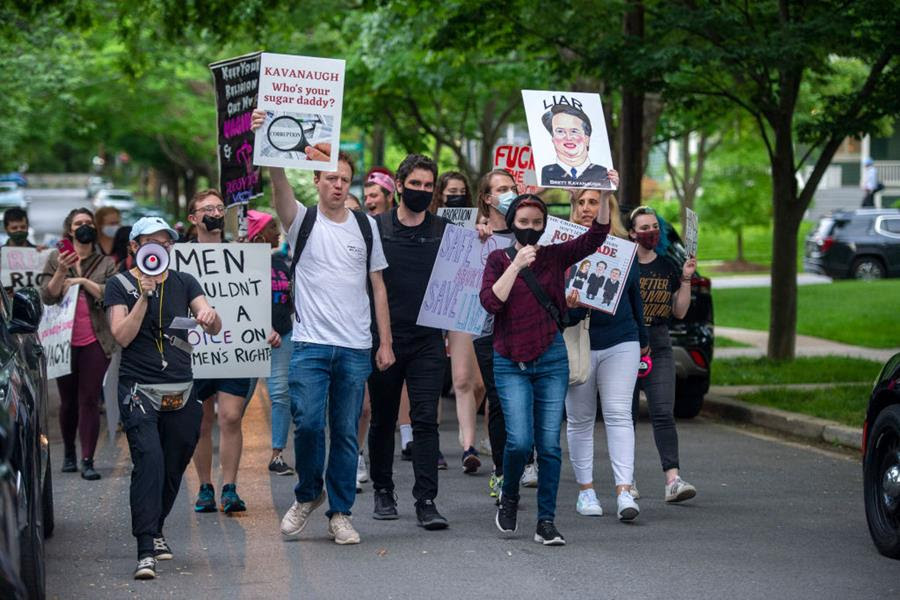
Samhita Mukhopadhyay: So, say the abortion decision comes in and it’s what we expect—meaning it overturns Roe v. Wade. What do the next 24 hours look like, especially in trigger-ban states? What happens if you have an appointment?
Renee Bracey Sherman: My real answer is just, it's going to be fucking chaos, utter chaos.
In states with the trigger bans, [say] someone is in a clinic waiting for care—they might be mid-care, mid-counseling. And I just really feel for those people who will schedule their appointment and go in and get as far as doing the counseling, doing the ultra[sound], maybe even have their legs in the stirrups, and then when the decision comes down, [they] will have to get off the examination table. And I don't know that people realize how heartbreaking that’s going to be.
And then they’re not going to be able to just go down to another clinic on the street or not even to the next state. And we've already seen the cruelty of states like Oklahoma, that saw that people [coming from Texas, where abortion is largely already banned] needed care, and then turned around and said, “Cool, we're going to get rid of this so you can't come here.”
We’ll [also] have lawyers reading through the decision. Let’s say we are overturning or reversing Roe v. Wade and Planned Parenthood v. Casey. But then you have to [look] at the fine print of the decision. What about Roe is wrong? What about Casey is wrong? Are there legal grounds for us to sue? What is that in comparison to what the state laws are, or the state statute? What laws are still on the books? Because there are a lot of places where laws from the 1800s are still on the books. Roe [negated] those. Do those laws go back into effect? Is there kind of a cross mix? It's pure chaos.
A lot of clinics will have to stop providing immediately because of the trigger bans, but also because their lawyers are going to advise them to stop until they can read through the decision and assess the level of risk.
And it’s not going to be [just] 24 hours, but months and maybe even a year, because there’s going to be lawsuits. And so there are questions of, “Can we provide abortions today? Can we not?”
And I think that's the saddest part about it: that people are just not going to be able to have clear information. So what we're asking people to do is to avoid at all costs the sensationalism and the wanting to freak out. Because people are trying to get abortions in that moment and they won't know whether this tweet is correct or this information is correct, and it's just exhausting and chaotic.
And I don't know that people realize how heartbreaking that’s going to be.
It's interesting to consider the idea of staying calm at that moment.
Somebody did a tweet saying that Plan B had been banned in a state and that tweet got tens of thousands of retweets. Plan B hasn’t been banned anywhere! Your insurance might not cover it and that sucks, but it’s not banned. The anti-abortion movement has a vested interest in sowing dysfunction and chaos because they don’t want anyone to be able to get an abortion. What they want is for people to think, This is just too hard, I'm going to go to jail. It's going to be bad. It's going to be unsafe, and give up.
The thing is that, as we’ve known for the last 4,000 years, people who have abortions never give up. We’ve been doing it for a long time. We will keep doing it. That’s not going to change, but what we can do is ask people to take a breath and fact-check the information before spreading it widely and turning into alarmists. Is that a word?
That is a word! This idea of keeping calm and making sure your information is accurate, that’s a really important call to action. What other advice do you have for people who want to help right after the decision? Should we hit the streets? Should we be chaining ourselves to fire hydrants?
We need all tactics. People absolutely should take to the streets and protest and make their voices heard. I do love a good protest and I want to make sure that we don’t have a couple of protests and then it dies off and people go back to accepting this as the new status quo and normalize this, which I feel is what’s happened over the last decade.
What’s really challenging at this moment is that we are being attacked from eight million different directions and so people do lose interest, because there's another tragedy or another horrible decision to come down. So how do we keep the stamina to actually make a change so that the people who are harmed in the process aren’t forgotten?
Yes, absolutely protest. Absolutely vote, for sure. Vote for pro-abortion candidates up and down. Become a single-issue voter. If your candidate is not super supportive of abortion, I promise you they’re probably not good on a whole lot of other issues either. I've never met an anti-abortion candidate who was excellent on Medicaid coverage of healthcare and immigration and literally everything else.
But then getting involved in your community is really what I ask people to do. Open up to your community. Become a person that people can go to, to receive care. Whether that’s opening up your home, opening up your car for rides, giving up your time at a local clinic or clinic defense, if that’s what the clinic wants. And then, of course, show up and become a monthly donor to your local abortion fund. Also, know the self-managed abortion protocol. You may not need it, but someone in your life may need it.
I think it's really, really essential that people look around at what’s happening in their communities because there is a lot of work happening already. You do not have to recreate the wheel. Do not try to create an “underground railroad”; just stop. That's really anti-Black language. It's terrible. Just get involved with the people who are doing [that kind of work already] because there are a lot of security protocols and if you can’t give of your time or your money, that’s fine. You can just show up with love and support for the people in your life who need abortions and start the conversation at home. That’s really where we need to do the work.
You’ve been doing reproductive justice work for over a decade. How are you feeling right now?
I feel like I constantly swing between tired, frustrated, feeling a lot of despair, and also feeling like this sucks [but] we've got this. And I think there are days that it's extremely draining because we didn't have to be here if people [had taken] racial justice, economic justice, access to healthcare, and feminism seriously. But also, I'm in the middle of co-writing a book on the history of Black and brown people's experiences with abortion, and in working on that…I feel a little bit hopeful. Reading a lot of books on the history of abortion, it puts it in perspective when I'm thinking about this as something that's been [an] issue for thousands of years.
So I have to just remember that this moment in time is one blip on the large, expansive history of humankind and the history of abortion and that there has always been some sort of white supremacist, white Christian nationalist forces to try to tamp down, not just abortion, but sex and sexuality and people just living their lives. So I have to go, “Okay, this is part of it, and we can survive through this.”

Samhita Mukhopadhyay is a writer, editor, and speaker. She is the former Executive Editor of Teen Vogue and is the co-editor of Nasty Women: Feminism, Resistance and Revolution in Trump's America and the author of Outdated: Why Dating is Ruining Your Love Life, and the forthcoming book, The Myth of Making It.
Photo by Heather Hazzan
What to do when SCOTUS rules on Roe
|
No images? Click here  June 22, 2022 Dear Meteor readers, Does anyone else feel like SCOTUS is angling for a daytime Emmy with all of the drama the justices are building up over the release of the Dobbs v. Jackson Women’s Health Organization decision? After not issuing the ruling yesterday, the court has added a last-minute decision day for Friday of this week. We’ll take the days we can get—abortion patients and providers need them—but the anticipation is also killing me. Ahead of what we believe will be The Big Day, Samhita spoke to reproductive justice leader Renee Bracey Sherman about what to expect when the decision comes down. But before we get to the goods, let’s get through the news. Patiently, Shannon Melero  WHAT'S GOING ONNo return: Robb Elementary School in Uvalde, Texas is set to be demolished and a new facility built over it. Uvalde’s mayor explained during a press conference, “You can never ask a child to go back or a teacher to go back in that school ever.” (A similar decision was made after Sandy Hook.) Just before the press conference, the head of Texas state police had his own announcement: openly admitting that as many had suspected, the behavior of the officers on the scene that day was an “abject failure.” But the commanding officer has not yet been disciplined for how he chose to handle the operations of that day. 1.6 million reasons: If you don’t follow football closely, the name Daniel Snyder probably means absolutely nothing. Allow me to change that. Snyder, who owns the NFL’s Washington Commanders, was accused of sexually harassing and assaulting one of his employees in April 2009. Three months later, the issue was settled to the tune of $1.6 million, in a confidential settlement. Snyder is now facing another accusation of sexual harrassment. Meanwhile, the entire Commanders organization is under scrutiny by the House Oversight Committee, who’ve determined that Snyder obscured the findings of an internal investigation into the overall rampant culture of sexual harassment within the organization. The Committee also argues that Snyder “led a campaign” against women who had made claims about “widespread harassment.” NFL Commissioner Roger Goodell has been curiously absent from these proceedings but will be hauled out before the Committee this week to answer for what appears to be a gross lack of oversight. To borrow a line from an old superhero movie: “Who watches the Watchmen?” (And why are they doing such a bad job?) Unsung heroes: On Tuesday, Shaye Moss and her mother Ruby Freeman took the stand during the January 6 hearings—and displayed an unimaginable degree of bravery. Moss is a longtime election worker who was threatened, harassed, and made to fear for her life after Donald Trump made false claims about the 2020 election results, and, with the help of Rudy Giuliani, accused her and her mother of being part of a grand conspiracy to unseat him. Moss’s mother, who also worked the polls that year, testified via video, “There is nowhere I feel safe. Nowhere...Do you know how it feels to have the president of the United States target you?” I strongly recommend you watch their entire testimony.  A LITERAL PATRIOT, SHAYE MOSS. (PHOTO BY KEVIN DIETSCH VIA GETTY IMAGES) AND:
 RETROGRADE“It’s Going to be Fucking Chaos”Renee Bracey Sherman on the impending overturn of Roe, and what to expect in the first 48 hours BY SAMHITA MUKHOPADHYAY  THE FUTURE COULD LOOK LIKE THIS EVERY SINGLE POST-ROE DAY. (PHOTO BY CHIP SOMODEVILLA VIA GETTY IMAGES) As you know, the Supreme Court of the United States of America is set to overturn Roe v. Wade. The decision could come as early as tomorrow or likely in the next 10 days. If our worst fears are realized, this decision would set women’s rights and the rights of anyone with a uterus back generations. In the days, weeks, months, and years ahead there will be, most likely, a lot of thinking, strategizing, protesting, and rabble-rousing (along with crying and fist-shaking). The path forward will be a long one. But what should we do in the very short term—the moment the decision comes in? In anticipation of this moment, I sat down with Renee Bracey Sherman, a decades-long reproductive justice leader who, through her organization We Testify, has worked to elevate the stories of people who have had abortions. She also led the charge on the steps of the SCOTUS on the day the court heard oral arguments on Dobbs v. Jackson Women’s Health Organization, the case that will determine the future of abortion rights.  A LOVELY STROLL AROUND JUSTICE BRETT KAVANAUGH'S NEIGHBORHOOD. (PHOTO BY BONNIE CASH VIA GETTY IMAGES) Samhita Mukhopadhyay: So, say the abortion decision comes in and it’s what we expect—meaning it overturns Roe v. Wade. What do the next 24 hours look like, especially in trigger-ban states? What happens if you have an appointment? Renee Bracey Sherman: My real answer is just, it's going to be fucking chaos, utter chaos. In states with the trigger bans, [say] someone is in a clinic waiting for care—they might be mid-care, mid-counseling. And I just really feel for those people who will schedule their appointment and go in and get as far as doing the counseling, doing the ultra[sound], maybe even have their legs in the stirrups, and then when the decision comes down, [they] will have to get off the examination table. And I don't know that people realize how heartbreaking that’s going to be. And then they’re not going to be able to just go down to another clinic on the street or not even to the next state. And we've already seen the cruelty of states like Oklahoma, that saw that people [coming from Texas, where abortion is largely already banned] needed care, and then turned around and said, “Cool, we're going to get rid of this so you can't come here.” We’ll [also] have lawyers reading through the decision. Let’s say we are overturning or reversing Roe v. Wade and Planned Parenthood v. Casey. But then you have to [look] at the fine print of the decision. What about Roe is wrong? What about Casey is wrong? Are there legal grounds for us to sue? What is that in comparison to what the state laws are, or the state statute? What laws are still on the books? Because there are a lot of places where laws from the 1800s are still on the books. Roe [negated] those. Do those laws go back into effect? Is there kind of a cross mix? It's pure chaos. A lot of clinics will have to stop providing immediately because of the trigger bans, but also because their lawyers are going to advise them to stop until they can read through the decision and assess the level of risk. And it’s not going to be [just] 24 hours, but months and maybe even a year, because there’s going to be lawsuits. And so there are questions of, “Can we provide abortions today? Can we not?” And I think that's the saddest part about it: that people are just not going to be able to have clear information. So what we're asking people to do is to avoid at all costs the sensationalism and the wanting to freak out. Because people are trying to get abortions in that moment and they won't know whether this tweet is correct or this information is correct, and it's just exhausting and chaotic.
It's interesting to consider the idea of staying calm at that moment. Somebody did a tweet saying that Plan B had been banned in a state and that tweet got tens of thousands of retweets. Plan B hasn’t been banned anywhere! Your insurance might not cover it and that sucks, but it’s not banned. The anti-abortion movement has a vested interest in sowing dysfunction and chaos because they don’t want anyone to be able to get an abortion. What they want is for people to think, This is just too hard, I'm going to go to jail. It's going to be bad. It's going to be unsafe, and give up. The thing is that, as we’ve known for the last 4,000 years, people who have abortions never give up. We’ve been doing it for a long time. We will keep doing it. That’s not going to change, but what we can do is ask people to take a breath and fact-check the information before spreading it widely and turning into alarmists. Is that a word? That is a word! This idea of keeping calm and making sure your information is accurate, that’s a really important call to action. What other advice do you have for people who want to help right after the decision? Should we hit the streets? Should we be chaining ourselves to fire hydrants? We need all tactics. People absolutely should take to the streets and protest and make their voices heard. I do love a good protest and I want to make sure that we don’t have a couple of protests and then it dies off and people go back to accepting this as the new status quo and normalize this, which I feel is what’s happened over the last decade. What’s really challenging at this moment is that we are being attacked from eight million different directions and so people do lose interest, because there's another tragedy or another horrible decision to come down. So how do we keep the stamina to actually make a change so that the people who are harmed in the process aren’t forgotten? Yes, absolutely protest. Absolutely vote, for sure. Vote for pro-abortion candidates up and down. Become a single-issue voter. If your candidate is not super supportive of abortion, I promise you they’re probably not good on a whole lot of other issues either. I've never met an anti-abortion candidate who was excellent on Medicaid coverage of healthcare and immigration and literally everything else. But then getting involved in your community is really what I ask people to do. Open up to your community. Become a person that people can go to, to receive care. Whether that’s opening up your home, opening up your car for rides, giving up your time at a local clinic or clinic defense, if that’s what the clinic wants. And then, of course, show up and become a monthly donor to your local abortion fund. Also, know the self-managed abortion protocol. You may not need it, but someone in your life may need it. I think it's really, really essential that people look around at what’s happening in their communities because there is a lot of work happening already. You do not have to recreate the wheel. Do not try to create an “underground railroad”; just stop. That's really anti-Black language. It's terrible. Just get involved with the people who are doing [that kind of work already] because there are a lot of security protocols and if you can’t give of your time or your money, that’s fine. You can just show up with love and support for the people in your life who need abortions and start the conversation at home. That’s really where we need to do the work. You’ve been doing reproductive justice work for over a decade. How are you feeling right now? I feel like I constantly swing between tired, frustrated, feeling a lot of despair, and also feeling like this sucks [but] we've got this. And I think there are days that it's extremely draining because we didn't have to be here if people [had taken] racial justice, economic justice, access to healthcare, and feminism seriously. But also, I'm in the middle of co-writing a book on the history of Black and brown people's experiences with abortion, and in working on that…I feel a little bit hopeful. Reading a lot of books on the history of abortion, it puts it in perspective when I'm thinking about this as something that's been [an] issue for thousands of years. So I have to just remember that this moment in time is one blip on the large, expansive history of humankind and the history of abortion and that there has always been some sort of white supremacist, white Christian nationalist forces to try to tamp down, not just abortion, but sex and sexuality and people just living their lives. So I have to go, “Okay, this is part of it, and we can survive through this.”  PHOTO BY HEATHER HAZZAN Samhita Mukhopadhyay is a writer, editor, and speaker. She is the former Executive Editor of Teen Vogue and is the co-editor of Nasty Women: Feminism, Resistance and Revolution in Trump's America and the author of Outdated: Why Dating is Ruining Your Love Life, and the forthcoming book, The Myth of Making It.  Please be sure to share this newsletter with anyone else wondering what to do once this decision comes down. FOLLOW THE METEOR Thank you for reading The Meteor! Got this from a friend? Sign up for your own copy, sent Wednesdays and Saturdays.
|
![]()
The real meaning of Juneteenth
|
No images? Click here  June 18, 2022 Dear Meteor readers, Dare I say it? I’m feeling pretty good this week. I’ve been deeply entrenched in two docuseries and it’s proven to be a welcome hours-long break from reality. If you’re looking to fill time before the next catastrophe, I highly suggest Keep Sweet: Pray and Obey (about Warren Jeffs and the Fundamentalist Church of Jesus Christ of Latter-Day Saints) on Netflix or if you’re staying away from crime docs, ESPN’s latest 30 For 30 installment, Dream On, which covers the creation of the 1996 U.S. Olympic women’s basketball team. We’ve got a busy weekend ahead of us with Father’s Day and Juneteenth. In commemoration of the latter, Meteor editor-at-large Rebecca Carroll asked six brilliant Black women their take on the holiday—from its significance to the pitfalls of commercialization. We’ve even got the official unofficial playlist for the day. But first, some news. In joy and freedom, Shannon Melero  WHAT'S GOING ONBaby got vax: Fantastic news for the toddler set—the FDA has approved Covid-19 vaccines for children under five, just in time for summer vacation. Both Pfizer and Moderna shots have been deemed safe (sorry Johnson & Johnson, you don’t get a final rose) and doses will start finding their way into chunky baby arms beginning June 20th, the Biden administration said in a statement. Considering the lack of mask mandates and the decreased chatter about variants, we may act as if the virus is no longer a threat, but COVID and her horrid stepchildren Delta and Omicron are still very much among us and who knows when they’ll be inviting their distant cousin Epsilon over to party. Be well, bbs! Iowa 👎🏼: On Friday, Iowa’s Supreme Court took an enormous step backward and declared that abortion is not a protected right under the state’s constitution, just as the country is on pins and needles waiting for the Dobbs decision. This move overturns a previous court’s decision that abortion was protected under the privacy rights laid out in the Iowa constitution. What’s changed since the last decision? The new Iowa court is filled to the brim with conservative Republican judges hell-bent on limiting the freedoms of their citizens. What do we do when Republicans try to block our rights? We donate to the Iowa Abortion Access Fund. AND:
  SAY IT LOUDSix Black Women on the Meaning of JuneteenthIts history, its future, and yes, that dumb ice creamBY REBECCA CARROLL  A JUNETEENTH REPARATIONS RALLY HELD IN NEWARK, 2022 (PHOTO BY MICHAEL M. SANTIAGO VIA GETTY IMAGES) Leave it to Texas to pretend they didn’t hear that slavery was over. While the Emancipation Proclamation was passed in 1863, the then-still border state of Texas was like, “What? No, uh-uh. We don’t know her.” On June 19, 1865, though, Union troops arrived in Galveston to take control of the state and make sure that all enslaved people were freed. That day became Juneteenth, a holiday commemorating the official abolishment of slavery. A holiday for us—for Black folks. One hundred and fifty years later it’s now a commercial holiday—used in brand campaigns and Walmart’s failed ice cream—and I feel ambivalent about that. What’s to prevent it from turning into another MLK Day or Black History Month, both of which feel more like lip service as opposed to an actual appreciation of what we’re meant to be commemorating? I mean, this is America: How can we trust the country built on the backs of Black folks—a country that continues to be as happy-pants racist as it wants to be—to honor the day we got free? So, yes, I have questions and concerns about Juneteenth, but I also really wanted to find a way to commemorate it in a meaningful way. I decided to talk to a group of brilliant Black women—writers, creatives, and artists—to offer some perspective on the holiday. First, about that commercialization. Do you think it has undermined the historical value of Juneteenth for Black folks in America? “Juneteenth will remain a significant holiday—because of its symbolic meaning and historical legacy—regardless of recent commercialization efforts. We live in a capitalist society, which means that we can almost always expect companies to exploit holidays—and just about anything—to yield a profit. Plus, it is certainly easier for companies to sell goods and services than to find concrete ways to redress past harms or address current discriminatory practices. Still, I am encouraged by the swift public response when companies go too far. It’s a reminder that we can play a key role in demanding better from those that drop the ball.” –Dr. Keisha N. Blain, professor of Africana studies and history at Brown University What would be the best possible reason for the hashtag Juneteenth to go viral? “The best reason for #Juneteenth to go viral [would be] Black Americans actually receiving meaningful reparations for the enslavement of our ancestors, because we know that will not happen in 2022. The second best reason for #Juneteenth to go viral [would be] the announcement that the rich history of Black Americans since they were brought to these shores in bondage, will be taught in schools. No longer just a paragraph about Martin Luther King and how enslaved Africans were akin to migrant workers, all students would learn how we built this country. I don’t see that happening either, so how about #Juneteenth goes viral because all Black people get the Friday closest to June 19th off from work? Just us.” –April Reign, equity and inclusion advocate, and creator of #OscarsSoWhite  REPARATIONS AND LAND! (PHOTO BY MICHAEL M. SANTIAGO VIA GETTY IMAGES) What is the single most important thing to get right about Juneteenth as a journalist? “Journalists should speak of Juneteenth as an ‘is’ instead of a ‘was.’ It’s not a siloed moment of history. What it represents—the willfully delayed emancipation of Black people—speaks directly to this perilous time and the denial of our rights. It must also be framed within the context of anti-CRT/American history laws that will gut the significance of Juneteenth by erasing from libraries and classrooms the nearly 250 years of chattel slavery that preceded it.” –Renée Graham, journalist and opinion columnist for the Boston Globe What’s funny about Juneteenth? “It’s ‘hilarious’ that we finally have a national holiday to celebrate our freedom, yet we’re still not truly free.” –Yvette Nicole Brown, actress (Big Shot) and TV host If you were making a playlist called Juneteenth, what 10 songs would be on it? Alright - Kendrick Lamar A Chance to Say My Piece - Taylor McFerrin Formation - Beyoncé This Is America - Childish Gambino My People…Hold On - Eddie Kendricks Can You See? - Madison McFerrin Every Nigga Is a Star - KeiyaA Say It Loud - I’m Black and I'm Proud - James Brown Post Black Anyway - THEESatisfaction Baltimore - Nina Simone –Madison McFerrin, singer/songwriter  IT'S SCIENTIFICALLY IMPOSSIBLE TO CREATE A PLAYLIST THAT DOESN'T INCLUDE KENDRICK LAMAR (PHOTO BY SANTIAGO BLUEGUERMAN VIA GETTY IMAGES) Why is Juneteenth important to you as a mother? “Black history is American history. But in our house, what I tell my daughter is that Black history is also a master class in hope. To me, Juneteenth matters because it says: ‘Keep going, the future you want is coming.’” –Veronica Chambers, editor of narrative projects at The New York Times, and author of Shirley Chisholm is a Verb 
FOLLOW THE METEOR Thank you for reading The Meteor! Got this from a friend? Sign up for your own copy, sent Wednesdays and Saturdays.
|
![]()
Six Black Women on the Meaning of Juneteenth
BY REBECCA CARROLL
Leave it to Texas to pretend they didn’t hear that slavery was over. While the Emancipation Proclamation was passed in 1863, the then-still border state of Texas was like, “What? No, uh-uh. We don’t know her.” On June 19, 1865, though, Union troops arrived in Galveston to take control of the state and make sure that all enslaved people were freed. That day became Juneteenth, a holiday commemorating the official abolishment of slavery. A holiday for us—for Black folks.
One hundred and fifty years later it’s now a commercial holiday—used in brand campaigns and Walmart’s failed ice cream—and I feel ambivalent about that. What’s to prevent it from turning into another MLK Day or Black History Month, both of which feel more like lip service as opposed to an actual appreciation of what we’re meant to be commemorating? I mean, this is America: How can we trust the country built on the backs of Black folks—a country that continues to be as happy-pants racist as it wants to be—to honor the day we got free?
So, yes, I have questions and concerns about Juneteenth, but I also really wanted to find a way to commemorate it in a meaningful way. I decided to talk to a group of brilliant Black women—writers, creatives, and artists—to offer some perspective on the holiday.
First, about that commercialization. Do you think it has undermined the historical value of Juneteenth for Black folks in America?
“Juneteenth will remain a significant holiday—because of its symbolic meaning and historical legacy—regardless of recent commercialization efforts. We live in a capitalist society, which means that we can almost always expect companies to exploit holidays—and just about anything—to yield a profit. Plus, it is certainly easier for companies to sell goods and services than to find concrete ways to redress past harms or address current discriminatory practices. Still, I am encouraged by the swift public response when companies go too far. It’s a reminder that we can play a key role in demanding better from those that drop the ball.”
–Dr. Keisha N. Blain, professor Africana studies and history at Brown University
What would be the best possible reason for the hashtag Juneteenth to go viral?
“The best reason for #Juneteenth to go viral [would be] Black Americans actually receiving meaningful reparations for the enslavement of our ancestors, because we know that will not happen in 2022. The second best reason for #Juneteenth to go viral [would be] the announcement that the rich history of Black Americans since they were brought to these shores in bondage, will be taught in schools. No longer just a paragraph about Martin Luther King and how enslaved Africans were akin to migrant workers, all students would learn how we built this country. I don’t see that happening either, so how about #Juneteenth goes viral because all Black people get the Friday closest to June 19th off from work? Just us.”
–April Reign, equity and inclusion advocate, and creator of #OscarsSoWhite

What is the single most important thing to get right about Juneteenth as a journalist?
“Journalists should speak of Juneteenth as an ‘is’ instead of a ‘was.’ It’s not a siloed moment of history. What it represents—the willfully delayed emancipation of Black people—speaks directly to this perilous time and the denial of our rights. It must also be framed within the context of anti-CRT/American history laws that will gut the significance of Juneteenth by erasing from libraries and classrooms the nearly 250 years of chattel slavery that preceded it.”
–Renée Graham, journalist and opinion columnist for the Boston Globe
What’s funny about Juneteenth?
“It’s ‘hilarious’ that we finally have a national holiday to celebrate our freedom, yet we’re still not truly free.”
–Yvette Nicole Brown, actress (Big Shot) and TV host
If you were making a playlist called Juneteenth, what 10 songs would be on it?
Alright - Kendrick Lamar
A Chance to Say My Piece - Taylor McFerrin
Formation - Beyoncé
This Is America - Childish Gambino
My People…Hold On - Eddie Kendricks
Can You See? - Madison McFerrin
Every Nigga Is a Star - KeiyaA
Say It Loud - I’m Black and I'm Proud - James Brown
Post Black Anyway - THEESatisfaction
Baltimore - Nina Simone
–Madison McFerrin, singer/songwriter

Why is Juneteenth important to you as a mother?
“Black history is American history. But in our house, what I tell my daughter is that Black history is also a master class in hope. To me, Juneteenth matters because it says: ‘Keep going, the future you want is coming.’”
–Veronica Chambers, editor of narrative projects at The New York Times, and author of Shirley Chisholm is a Verb
"Black people feel less pain" and other lies
|
No images? Click here  June 15, 2022 Dear Meteor readers, I hope you are well. I am trying to keep calm while we wait for the SCOTUS to make decisions. I am distracting myself with the things that are good: my cats, the sunshine, and all of you loyal and committed readers. Today, my dear friend, writer, and professor Syreeta McFadden talks to award-winning journalist Linda Villarosa about her new book, Under the Skin, and what she’s learned in her years as a health reporter. It’s a really freakin’ good conversation. But first, the news. It’s dark and hell is hot, Samhita Mukhopadhyay  WHAT'S GOING ONLabor woes: Employees at various Starbucks locations are working to unionize and the company’s overlords are pushing back by threatening to limit access to healthcare for trans employees. According to Them, workers have filed a charge against Starbucks with the National Labor Relations Board for creating a “coercive and hostile environment” including threatening the loss of gender-affirming health benefits if they vote for union representation. (Starbucks did not respond to the charge but their stance on the matter is made clear on their union-busting website.) You know what we’re not going to do in the month that we celebrate our Lord and savior Marsha P. Johnson? Remain idle while workers, trans or otherwise, are stripped of their rights. So until Starbucks comes around, consider putting your money into that local coffee shop instead of paying a small fortune for your non-dairy venti secret menu unicorn frappuccino with extra whip. #BringBGHome: WNBA star Brittney Griner’s wrongful detention in Russia has been extended once again to July 2. The Russian court system has moved Griner’s hearing, on the alleged charge of possessing cannabis paraphernalia, which means she will remain in the custody of Russian authorities where she has been held without due process for over 100 days. As a professor of military and strategic studies told ESPN, “Dragging out her detention, missing court deadlines–these are key indicators that we should question the legitimacy of her arrest, precisely why the U.S. classified it as a wrongful detention.” So why is President Biden—a man who claims to love women’s sports so much he practically adopted the USWNT—dragging his feet on this issue? Party crashers: The Proud Boys and other far-right groups have been interrupting family-friendly drag events across the country during Pride month (which is painfully ironic considering their name is Proud Boys). One such event was a drag queen story time where Bay Area drag queen, Panda Dulce was reading story books to children. Imagine getting so enraged about story time that you pull up to a children’s event to yell? Get a life. Despite these ongoing expressions of hateration, Pride events are going forward thanks to the fearless queens who have been attending and the businesses that have been supporting them (like Rabble Rise Doughnuts in New Jersey who put on a WONDERFUL Drag Queens and Doughnuts event for families.) 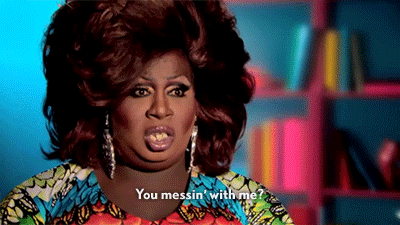 AND:
 HEALTH REPORT“Something* About Being Black Is Creating a Health Crisis”*It's racism! BY SYREETA MCFADDEN  YOU SEE THAT GLOW? IT'S THE SHINE OF INCREDIBLE KNOWLEDGE. (IMAGE VIA LINDA VILLAROSA.COM) Linda Villarosa has been raising the alarm about African American health for nearly forty years. First, as a health reporter and editor for Essence Magazine in the late 1980s and ‘90s, and later in her book, Body & Soul: The Black Woman’s Guide to Physical Health and Emotional Well-Being. Her prolific reporting for The New York Times has examined the infant and maternal mortality in Black mothers and babies, racial disparities in both the HIV and COVID pandemics, and life expectancy in Black communities, namely her hometown of Chicago. Just this past weekend, she wrote the cover story for The New York Times Magazine about the grotesque, continuing practice of legalized forced sterilizations of poor Black and brown women. Villarosa’s new book, Under The Skin: The Hidden Toll of Racism on American Lives and on the Health of Our Nation, is out this week and is a culmination of decades of extensive reporting and research exploring racism in healthcare. Through profiles of Black women and men from different backgrounds, supplemented with extensive studies, Villarosa lays bare the forces that account for Black people living sicker and dying quicker than their white counterparts. Her findings are profound. For example, regardless of education and income, Black Americans still live in more polluted areas, suffer more from chronic illnesses, and have higher death rates from conditions like diabetes, stroke, and heart disease than white people. College-educated Black mothers have higher infant mortality rates than white mothers who haven't graduated from high school. “Yes, something about being Black is a creating a health crisis,” Villarosa writes, “and that something is racism.” As I read Under The Skin, I had frequent flashbacks to my own experiences navigating health care and reading Villarosa’s articles in Essence when I was younger. (Her articles were so popular, she tells me, that people would Xerox and share them.) So I was thrilled to have the opportunity to talk to her. ROUND OF APPLAUSE TO SEAN GERARD CLARK WHO IS RESPONSIBLE FOR THIS GRIPPING COVER ART. (SCREENSHOT VIA INSTAGRAM) Syreeta McFadden: In this book, you challenge dominant—as well as your own—assumptions about the root causes of racial health disparities. Why was it important for you to flip the gaze on yourself? And what did you discover that you had to unlearn? Linda Villarosa: It’s been a real challenge because I’m an American, born and raised in a culture that teaches you that personal responsibility is everything. And that you, as an individual, are in charge of your own destiny, your own health, and your own wealth, without looking at the structural, institutional, and historical discrimination and racism that we as African Americans have faced. My family was a bootstrapping kind of family. My grandparents came up from Mississippi [to Chicago], and my parents finally managed to dig their way out of [there]. I ended up at Essence magazine, where the thinking was if you empower each individual Black woman, who is usually in charge of a family, you can change the health of Black people. So it was if you know better, you do better kind of thinking. And I worked really hard to get as much information as I could to Essence readers. At the time, Essence had a huge reach among Black women. [In 1991], I went to public health school, and I started learning that not everything is individual, there are health policies, and there’s the history of [racism in] America. And later, my own pregnancy, showed me I was doing everything right, [but it still] wasn’t that easy. It was much more fraught than I would have expected, given my insurance status, my health status, my income, and my education. I still believe that taking the best care of yourself is smart. But now I see that to achieve optimal health, we have to explore what has happened to us in America and the effect of living in a discriminatory or racist society. In the book, you share a much more complete history of the origins of Dr. Arline Geronimus’s “weathering hypothesis.” Arline is probably 70ish [and has] been thinking about this theory of “weathering” since she was in college. The idea is that the discrimination we as Black people especially as Black women face has a weathering effect: which means it's prematurely aging our bodies. And it's the culmination of at minimum micro at worse macro aggressions. And she spelled it out for me and I really liked the poetry of the word weathering. Weathering is at once the effect of discrimination and everyday insults, as well as big picture insults on our bodies, like the way a storm weathers a house, it knocks the paint off the outside, it messes up the roof, it pulls the shutters off the hinges. But then we also as people weather the storm, and we have kinship and we have community and we have friends and we have spirituality. So I really liked that dual meaning of weathering. There’s a chapter where you write about the medical community’s understanding and recognition of pain in Black bodies. Could you talk a little bit about that? I really dug deep into that when I was working on my 1619 Project essay [which explored the dangerous fallacy of pain tolerance in Black people]. During the years of slavery, there were doctors and scientists who were also enslavers; they owned human beings and they had a vested interest in keeping slavery in place. And one of the ways they did it was to use science and “data”—to push the false idea that Black people have super high pain tolerance. So that allowed people to not feel bad when they worked us from sunup to sundown, beat us, whipped us, castrated us, took our children away, killed us—all the things that happened. And it desensitized people to our pain. If we have a superhuman tolerance to pain, then it was okay to treat us badly, and it was okay to also perform medical experiments on our bodies. Slavery is over, but that idea is stuck in the American consciousness. Even as recently as 2016, there was a study of [about] 220 white medical students and interns, and they found that 40% had believed at least one false idea about Black people. And the most common one was that we had a higher tolerance for pain. In another [study], the question they asked was, if two people, one Black, and one white, got their hand slammed in a car door—what would the pain feeling be? And even these, you know, educated people who are the doctors of tomorrow said, oh, a Black person would feel that less. That was 2016. In the book, and in The New York Times Magazine cover story, you write so movingly about the Relfs, two sisters in their teens who were forcibly sterilized in Montgomery, Alabama in 1973. Their case revealed that over 100,000 Black and brown women were sterilized by US government programs for decades, harm that has continued. The article grapples with how to deal with reparations for Black people—and it's not just Black people, it’s Latinx people, it's sometimes poor white people—who were sterilized against their will or without informed consent. There were eugenics laws on the books in 32 states [but] they went away in the 70s and the United States still kept sterilizing people in prisons, and immigrants. So if we're looking for a concrete way to [repay] people who were sterilized, reparations is a way to do it. Three states have done it: Virginia and North Carolina had programs to give reparations to people who were sterilized, and California is in the midst of it right now. People like the Relf sisters, who are alive [but] never got a dime for their sacrifice, deserve an apology. And they deserve some kind of financial payment for the sacrifice they made. How do you hope this book will transform the conversation around racism and health? I hope this book is a data-driven, research-based, evidence-based tool to help people understand, people who really have been trying to talk about it and don't have the tools. I don’t want people in the healthcare system to feel defensive—that I'm saying, you're racist—because I think we all have blind spots. Health care providers are heroes, but we still all have blind spots. And if we understand them and confront them as a country and in the healthcare system, that’s how we can make things different. I also don’t want our folks to be afraid of the health care system. But I want us to go in with our eyes open—to go in with support, to go in with questions, to go in with, you know, knowing, and to gently push back. And if you can’t do it for yourself, bring someone with you. This interview has been edited for length and clarity.  Syreeta McFadden is a freelance writer and professor of English at the Borough of Manhattan Community College, City University of New York. Her work has appeared in The Atlantic, Rolling Stone, BuzzFeed News, and elsewhere.  Did you find this newsletter enlightening? Spread the love and the info by forwarding this email to a friend. FOLLOW THE METEOR Thank you for reading The Meteor! Got this from a friend? Sign up for your own copy, sent Wednesdays and Saturdays.
|
![]()



